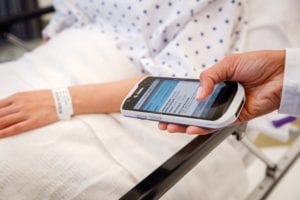 Zebra Technologies recently announced that their TC52-HC handheld touch computer was approved for use with Rover, Epic’s mobile app and in so doing pushed Computers on Wheels (COWs), Workstations on Wheels (WOWs) and iPhones further from clinical floors of hospitals.
Zebra Technologies recently announced that their TC52-HC handheld touch computer was approved for use with Rover, Epic’s mobile app and in so doing pushed Computers on Wheels (COWs), Workstations on Wheels (WOWs) and iPhones further from clinical floors of hospitals.
Zebra’s healthcare devices have always been rugged, secure, and lightweight, but since the start of the pandemic, there has been one particularly welcome feature – they are easy to clean and disinfect. This is one of the many reasons why more and more organizations are adopting them.
I recently had the opportunity to sit down with Rikki Jennings, Chief Nursing Informatics Officer at Zebra to find out more about their work with Epic and talk about why handheld devices will become more prevalent in healthcare organizations.
Data at the point of care
“The ability to access data at the point of care is crucial for delivering the best care possible,” said Jennings. “With the approval of the TC52-HC for use with this clinical mobile application, healthcare providers can equip their clinicians with tools to become better advocates for their patients.”
Historically, clinicians have used WOWs (workstation on wheels), but handheld devices can enable clinicians to work faster and better. The ability to respond to patients and colleagues on the fly without physically dragging in a whole workstation is a game changer. And can you imagine trying to disinfect an entire computer/keyboard arrangement?
A handheld device can also provide cameras and scanners for quick “face to face” video chats and the ability to scan bracelets and medications for quick, accurate medication administration with proper documentation.
“It’s all about enabling the most seamless workflows for care teams,” said Jennings.
Purpose-built design
When we think of handheld devices, we often think of our own personal technology – phones, tablets, and the like. But Jennings says we should think about healthcare handheld devices differently.
Clinical handheld devices take a lot of abuse. They are dropped. They get wet. Chemicals sometimes spill onto the screens. Staff even sit on their devices when they forget they are in their pockets. Healthcare handhelds need to be very rugged. I made the mistake once of cleaning my phone case with a bleach wipe and it broke down the plastic.
The devices also need to be on and operational 24/7/365. No one wants stop using their device while it charges, which is why Zebra devices have batteries that can be easily swapped out. That is not a feature of any modern smartphone.
“We need to look at the overall design,” stated Jennings. “It’s about eliminating nooks and crannies so that bacteria doesn’t collect there. No metal contacts which can corrode over time. There are so many design elements that go into a purpose-built device.”
The WOW factor
WOWs have been a staple of hospital operations for many years, but with the increasing power, connectivity and features of mobile devices like Zebra’s, their days could be numbered. Not only are they bulky and hard to drag around, WOWs are difficult to clean and disinfect.
In the past, the inability to view the electronic record on a mobile device slowed their adoption in healthcare. However, with mobile apps like Epic’s Rover, that is no longer a barrier.
Watch the full interview with Rikki Jennings to hear about:
- How Zebra creates a better environment for receiving test results
- How a mobile device can reduce medication related adverse events
- How Zebra helps improve pain management for patients
Listen and subscribe to the Healthcare IT Today Interviews Podcast to hear all the latest insights from experts in healthcare IT.
And for an exclusive look at our top stories, subscribe to our newsletter.
Tell us what you think. Contact us here or on Twitter at @hcitoday. And if you’re interested in advertising with us, check out our various advertising packages and request our media Kit.













